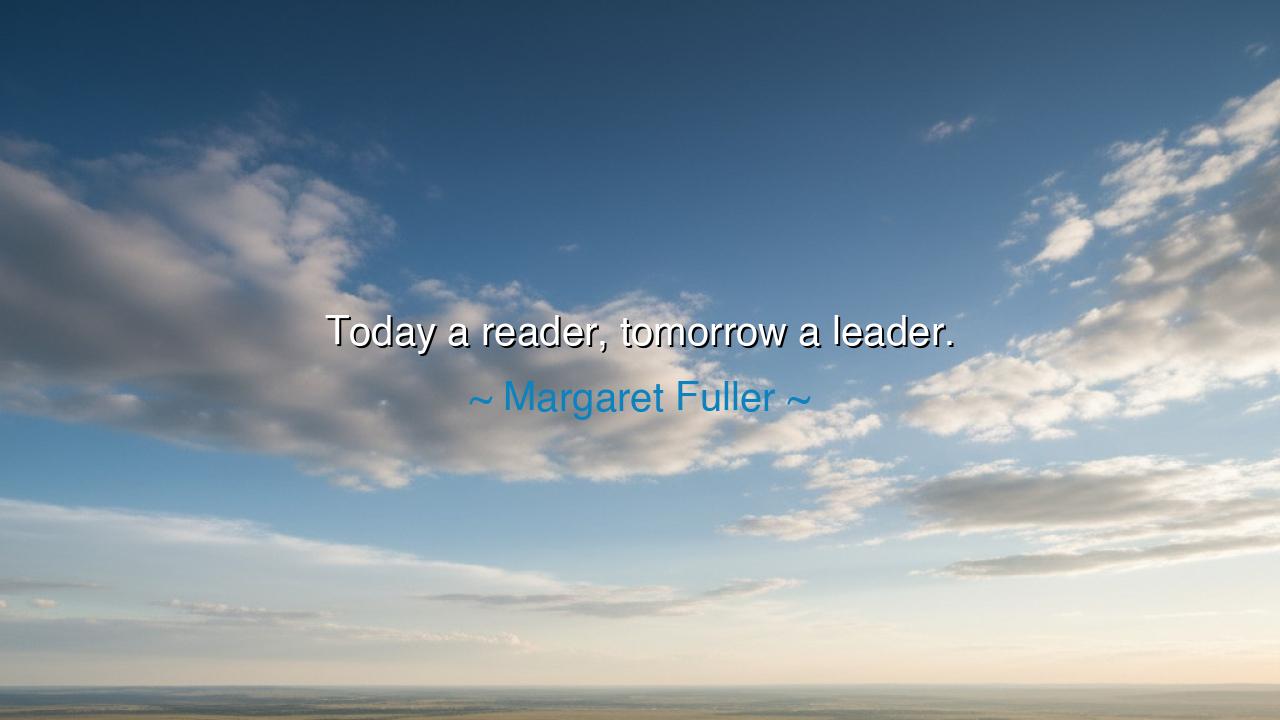
Today a reader, tomorrow a leader.






“Today a reader, tomorrow a leader.” Thus spoke Margaret Fuller, the brilliant voice of the American transcendentalist age—a woman of immense intellect, courage, and vision, who saw in the act of reading not mere learning, but transformation. Her words echo through the corridors of time, reminding every seeker that knowledge is the seed of leadership, and that every page turned is a step toward the awakening of power. For the reader, though quiet in the present, prepares in stillness for the mighty work of the future.
To read is no small act. It is not the simple gathering of words, but the communion of minds across the ages. When one reads, one enters into conversation with the wisest spirits who have ever lived. Their courage, their failures, their victories, their dreams—they pass through the written word like fire into the waiting heart. And from that fire, leadership is born. The reader learns to see farther than the moment, to understand the world not as it is, but as it could be. Thus, reading becomes the forge in which the soul of a leader is tempered.
Margaret Fuller, born in the early 19th century, was herself both reader and leader. In a world that confined women to silence, she devoured books with an insatiable hunger for truth. She read the philosophers, the poets, the historians—the architects of thought. Her mind became vast and luminous, her vision sharpened by the wisdom of others. From her reading sprang her power: she became the first female foreign correspondent in America, a reformer, and a voice for the education and emancipation of women. Her quote was not a gentle proverb—it was a prophecy spoken from experience. She had lived the truth that the one who reads deeply will one day lead greatly.
Consider the story of Abraham Lincoln, who, by the dim light of a fire in a log cabin, read the few books he could find—The Bible, Shakespeare, Aesop’s Fables, and the lives of great men. With no wealth, no mentors, and little formal schooling, Lincoln educated himself through reading. Those humble nights of study built within him a mind that could hold both reason and empathy, and when the hour of destiny came, it was the reader who rose to lead a nation through its darkest trial. His leadership was born not in palaces or universities, but in solitude, in pages turned by calloused hands.
This is the power Fuller spoke of. Reading does not merely fill the mind; it shapes the character. It teaches patience, reflection, and discernment—the very qualities of leadership. A leader must see beyond the surface of things, and reading trains the soul to look deeper. It nourishes imagination, without which vision dies; it teaches humility, for in reading, one is reminded how much remains to be learned. The reader becomes a vessel of understanding, ready to guide others through confusion into clarity.
But there is more: reading is not an end, but a beginning. To read without acting is to hoard treasure and never spend it. The true reader must rise and transform knowledge into service. The books of wisdom are torches meant to be carried into the world’s darkness. Thus, every reader bears responsibility—to share what they learn, to lead with compassion, to kindle thought where there is ignorance, and hope where there is despair. For reading is the first act of preparation; leadership is the second act of fulfillment.
Therefore, O seeker of greatness, read not merely to pass time, but to awaken your soul. Read what challenges you, what inspires you, what deepens your heart. Learn from the poets how to feel, from the philosophers how to think, from the heroes how to act. Let every word be a spark that shapes your destiny. For in the quiet of reading, you are building the foundation of something vast—the strength to lead others with wisdom and courage.
The lesson is clear: The world’s greatest leaders were once readers who dared to dream through the pages of others. So read with purpose, read with passion, and read as though the future depends on it—because it does. “Today a reader, tomorrow a leader.” Those who cultivate the mind today will command the future tomorrow, not through tyranny or force, but through the luminous power of understanding. And in that light, humanity will always find its way forward.






AAdministratorAdministrator
Welcome, honored guests. Please leave a comment, we will respond soon